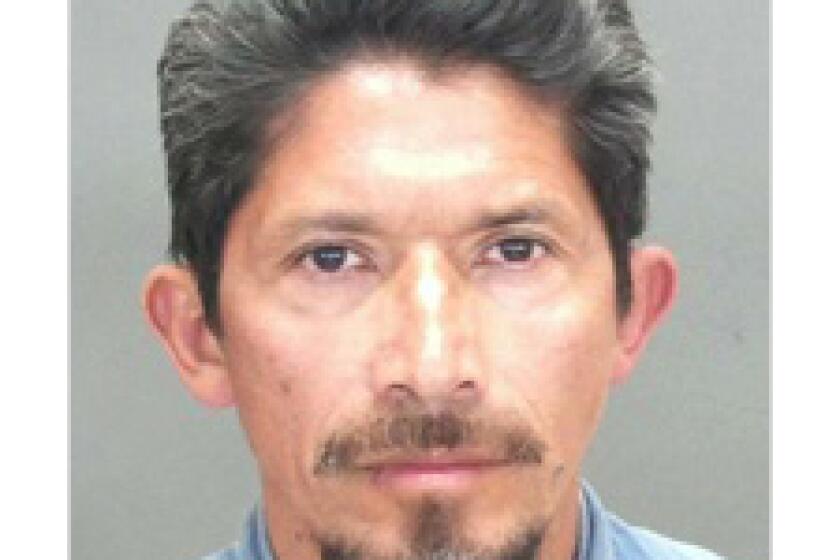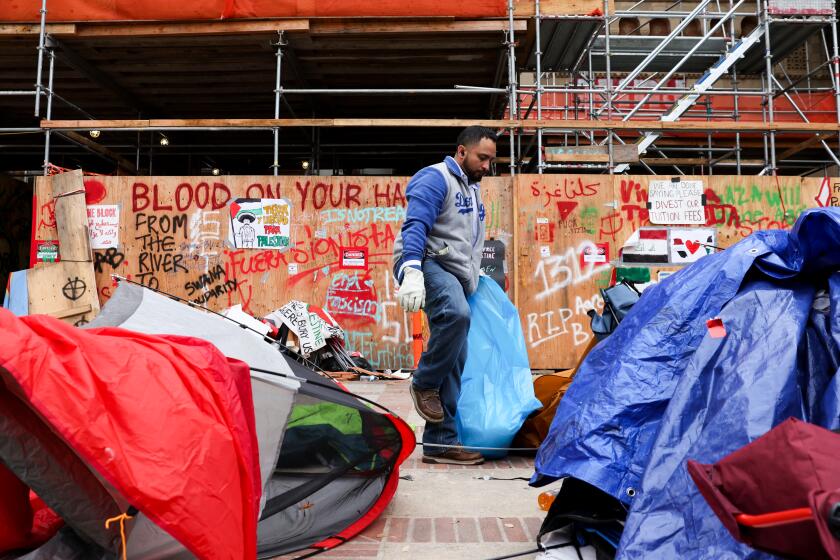Death Leaves Lingering Questions and a Search for Better Solutions
It was early afternoon when Michael Adelson, 42, called his mother and uttered the words she had been dreading.
“I think I’ve done something to kill myself,” he told Sandy Smith Levine.
Smith Levine, who lived near her son’s Woodland Hills apartment, called 911 and then got into her car and raced over there.
“I was just thinking, ‘I’ve got to save him,’ ” says the retired executive assistant, certain that her son had taken an overdose of pills.
The problems had begun when he was a teenager and they had grown steadily worse. A graduate of UCLA’s law school, her son was unemployed, abusive and sinking into the darkness of what she believed was manic depression.
“I got there and banged on the door,” Smith Levine says, reliving the events of March 22.
Her son answered, giving her a moment of relief that quickly turned to still more torment.
What sick game was he playing now?
Adelson told his mother he had called off the paramedics, telling them it was all a mistake. He had merely dreamed of committing suicide.
Smith Levine scolded him and left the apartment, her heart broken by her son’s deterioration. Then she called the LAPD and told them he still might kill himself.
Police confiscated an unregistered .357 Colt revolver and took Adelson into protective custody, transporting him to Olive View-UCLA Medical Center for an evaluation and possible 72-hour commitment.
After an exam that took less than two hours, Adelson, the divorced father of two teenage sons, was told to see his regular therapist and discharged.
Smith Levine could not believe he’d been released as quickly and easily as that. She called police, fearing that he’d retrieve the gun, and she says they told her not to worry. He couldn’t get it back without a court hearing.
But on April 23, Adelson went back to the West Valley police station in Reseda and was given his gun.
At 8:50 p.m. on May 15, he dialed 911, put that very Colt revolver to his head, and declared:
“I’m going to kill myself. Goodbye.”
The bullet entered one temple and exited the other.
And now everyone washes their hands.
The police say they did nothing wrong.
The hospital, through a county spokesman, says it did nothing wrong.
Smith Levine buried her son, and almost four months later she’s wondering when any of it will make sense.
A sick man threatens to kill himself after years of misery, an unregistered gun is taken from him, the hospital sends him home before checking in with his family or his psychiatrist, and getting the gun back from the police is easier than getting a fishing license.
“How can this happen?” asks Smith Levine, who now lives in Sherman Oaks.
She knows part of the answer. Her son was as smart as he was disturbed, and he was a master manipulator.
The psychiatrist at Olive View found him too healthy to be held for a 72-hour evaluation. He was “sad” and “animated,” says the doctor’s report, but “cooperative” and neither delusional nor suicidal. Had Adelson been held, he would not have been able to get his hands on the Colt .357 for five years without a court hearing.
Rick Swanston, the LAPD West Valley detective who handed the gun back to Adelson, says he couldn’t do anything else, even though the gun was unregistered.
“There’s no law that says you have to register a gun as a private citizen,” says Swanston.
“The law says you can’t have a stolen gun, but mere possession of a gun that’s not registered is not a crime.”
You hear these things, Smith Levine says, and you wonder who’s crazier. The patients, or the players in the revolving door that swings through the mental health system, law enforcement and the courts.
Swanston ran a computer check and found that Adelson’s gun was not stolen and had not been involved in a crime, so he couldn’t keep it on those grounds.
He checked twice to see whether the state Department of Justice had placed a hold on it at the request of doctors. But because Adelson had not technically been admitted to Olive View, the gun had no strings attached.
Swanston was going through the death and injury reports one day and came across a suicide.
“As soon as I saw his name, I thought, ‘Uh-oh, this is the man we gave the gun to a week or two ago.’ It was a horrible feeling, but there’s nothing we could have done any differently,” Swanston says.
“I feel sad for his mother because of this horrible tragedy, but if we didn’t give him the gun back, he could have walked down to the gun store to buy one, or he could have bought one on the street, or he could have used another method.”
All of that is true. But that doesn’t let Smith Levine sleep any easier. When she isn’t asking questions of the authorities, she’s asking questions of herself.
Did she do all she could have for her son?
Did she cook enough meals when he wouldn’t fend for himself, and pay his rent often enough when he couldn’t hold a job?
He saw a therapist, but should she have tried harder to get him more help, even though he drove her away with his increasingly psychotic rants?
The story of her utter helplessness and frustration has been told a thousand times over by families of the depressed and mentally disturbed, says Assemblywoman Helen Thomson (D-Davis), a former psychiatric nurse.
Last year, legislation by Thomson allowed families to begin testifying in commitment hearings. She also wrote a bill--passed by the Legislature and now in the hands of Gov. Gray Davis--that would allow for involuntary outpatient treatment.
In the case of Michael Adelson, Olive View would have had another option besides committing him or sending him home, Assemblywoman Thomson says. It could have asked the county to consider him for six months of court-ordered mental health visits, and if he didn’t show up, he could have been committed.
“I think it’s more humane than leaving people on the streets,” Thomson says, or leaving them entirely on their own after they’ve tortured a loved one by calling and threatening to kill themselves.
“It makes perfect sense to me,” says Smith Levine.
“I have a burning feeling in my stomach, knowing that what happened to my son is not right. If anyone can benefit from hearing about it, that’s all I want.”
*
Steve Lopez writes Sunday, Wednesday and Friday. Reach him at steve.lopez@latimes.com
More to Read
Start your day right
Sign up for Essential California for news, features and recommendations from the L.A. Times and beyond in your inbox six days a week.
You may occasionally receive promotional content from the Los Angeles Times.







